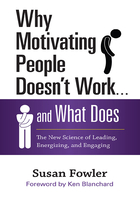
Try Serving Motivational Health Food
Kacey is perennially a top salesperson in her organization. When her company announced a contest to award top sellers with a weeklong spa trip, she felt offended. “Do they think I do what I do so I can win a week at a spa? Maybe it sounds corny, but I work hard because I love what I do. I get great satisfaction by solving my clients' problems and seeing the difference it makes. If my company wants to connect with me and show appreciation—that's different. Obviously, that isn't the case. If they knew me, they would understand that as a single mother, a spa week away is not a reward but an imposition.”
People with high-quality motivation, such as Kacey, may accept external rewards when offered, but this is clearly not the reason for their efforts. The reasons the Kaceys of the world do what they do are more profound and provide more satisfaction than external rewards can deliver.
Kacey would have found it easier if her organization had been more attuned to her needs rather than falling into the junk-food belief that salespeople are motivated by money and rewards. Instead, she found herself in an awkward situation. She didn't want to get sucked into the low-quality motivation of the reward trip, but she was fearful of offending her manager and colleagues by refusing the trip or complaining about the choice of reward.
Being an exemplary self leader, Kacey initiated a meeting with her manager to discuss the situation. She explained how the incentive program had the opposite effect than her manager had probably intended. She declared that she would continue selling and servicing her customers with her customary high standards—regardless of winning a reward. Kacey and her manager both described the conversation as “liberating.” They felt it deepened their relationship because the manager now understood Kacey's internal dedication to her work.
At the end of the next sales cycle, Kacey had exceeded her goals for her own high-quality reasons. Instead of imposing a reward on her, Kacey's manager conferred with her about a way that he could express his gratitude for her achievements within fair price and time boundaries. Kacey chose an activity that she and her young child could enjoy together. Rather than interpreting the reward trip as a carrot to work harder, Kacey internalized it as an expression of her organization's gratitude. She reported how different the experience was from previous award trips: “The week took on special significance as a heartfelt thank-you from my manager and a wonderful memory-making experience with my child.”
Kacey's deepened relationship with her manager and feeling valued was far more rewarding than winning a contest. There are significant implications for the organization when people experience high-quality motivation. They achieve above-standard results; demonstrate enhanced creativity, collaboration, and productivity; are more likely to repeat their peak performance; and enjoy greater physical and mental health.